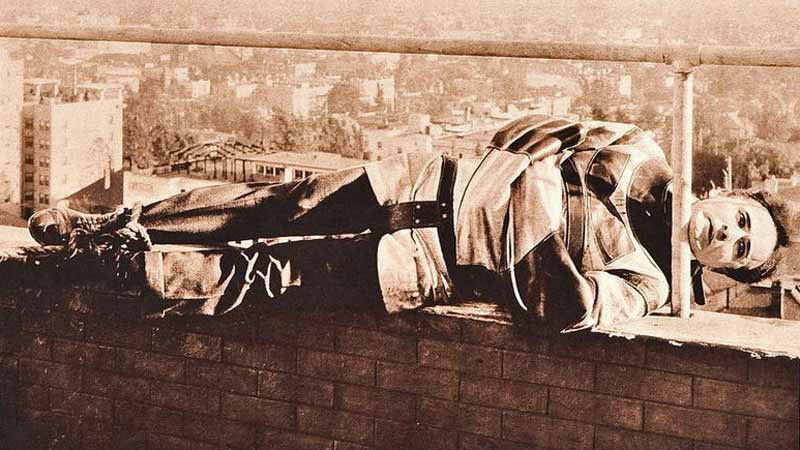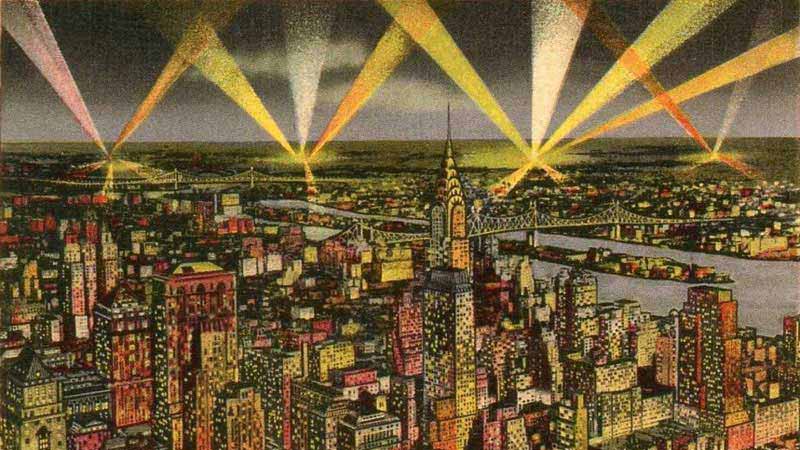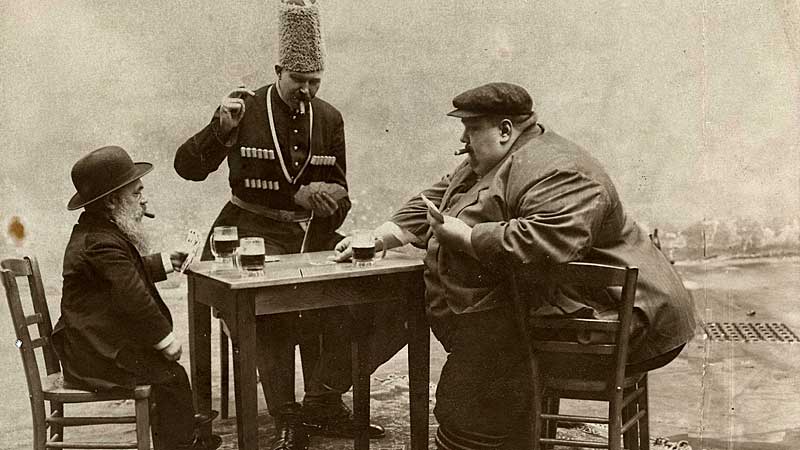Mario Marchese's "POW! The Perfect Power of Props" Podcast Interview
by Roland Sarlot and Christian Painter
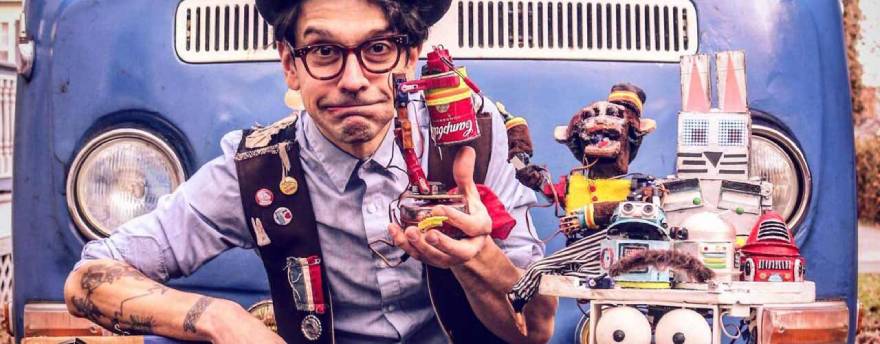
What We'll Explore
Mario "The Maker Magician" Marchese shares his enthusiasm for the power of props, where innovation arises, finding inspiration, knowing what's important, handling technical failures, and transforming props you already have around the house.
Who is Mario Marchese?
Today's guest has appeared on Sesame Street, Universal Kids, and live on-tour with David Blaine, who called him, "The best kids magician in the world!" Based in New York, Mario Marchese performs as a slapstick character specializing in up-cycled props and do-it-yourself robotic creations. He has lectured at MagicLive, Penguin, and the Magic Castle, and has written the book “The Maker-Magicians Handbook” which guides you through building an entire magic show from items around your home. It is available online and in brick and mortar book shops.
Running Time:
The following interview has been edited and condensed for clarity.
What you can do
You are welcome to share up to 500 words of the below transcript in a non-commercial purpose provided you credit and link back to our site like this: "The Magic Oracle Business Podcast".
The Interview
Roland Sarlot: On this episode of the Magic Business Podcast, you'll hear this and more...
Mario Marchese: And I think that's the goal. Sometimes we get caught up where we are looking for this one trick in the dealer’s room that is going to change our life, and it doesn't exist. It doesn't exist. There is no trick that is going to change your game. The game is you. You have to find out why you want to be on stage. What's your story?
Roland Sarlot: Welcome to the Magic Business Podcast, where we share insightful and delightful inner secrets about the business of magic. This is where magic professionals present their real-life experiences and some of their most guarded secrets to help further your career in the magical arts. I'm your host, Roland Sarlot, in partnership with the MagicOracle.Club, where you can hear all of our Magic Business podcasts.
Our next guest has appeared on Sesame Street, Universal Kids, and live on tour with David Blaine, who called him “the best kid's magician in the world”. Based in New York, Mario Marchese performs as a slapstick character specializing in up-cycled props and do-it-yourself robotic creations. He has lectured at Magic Live, Penguin, and the Magic Castle, and has written the book, "The Maker Magicians Handbook," which guides you through building an entire magic show from items around your home, as well as introduces you to 3D-design, 3D-printing, and programming. The book is even available on real-life analogue shelves near you. Mario, welcome to the Magic Oracle.
Mario Marchese: Thank you so much for having me. This is awesome. Thanks Roland.
Roland Sarlot: It's great to have you. Mario, have you ever performed a show with no props?
Mario Marchese: Oh, that's a great question. I was challenged a couple of years ago. I was fortunate to work with David Blaine and he gave me some challenges, to stand in front of an audience with just the items that are on me, without touching my props. It was a crazy experience and you know what? It taught me a lot. It taught me a lot.
Roland Sarlot: Was it a frightful experience?
Mario Marchese: Oh, one hundred percent. It was beyond frightful. I was sweating. It was such a beautiful thing because it forced me to come up with new bits with just my hat, and a pack of cards, shooting cards into my hat. Creating slapstick routines on the fly. At the time it was scary, but looking back I got some really good material out of it.
Roland Sarlot: It is great to be challenged and be so scared, and probably be so much on the edge, and yet that challenged your creativity to come up with new material.
Mario Marchese: I think that's the key to having great innovation, great inventing… is what we are limited by. I think that is something... I always think about that. When we use everything we possibly can with what we have, it is something that is a big theme in my show. I always talk about that. Do what you love, use what you have, and have fun. That "use what you have" part is so key. Putting yourself in new situations, being a fool. There is some real wisdom with doing that.
Roland Sarlot: What do props offer the performer, or what do props offer you?
Mario Marchese: That's a great question. The props give you a chance to take the heat off of you as a performer. The idea for me... My dream when I became a magician, the reason I got into it, was the whole fascination with automatons. The idea that I can step away from my suitcase and there is something that is moving mechanically, and all the eyes of the audience are looking at that, while I can do nothing, while my hands are free. That kind of principle is what sucked me in, so yeah, props, there is something magical about animating a prop. That's kind of the rabbit hole I fell in as a magician.
Roland Sarlot: Well, it is magical, but what a lot of, especially mentalists, would say is they don't want props on stage. They don't even want a deck of cards. They just want nothing. They just want a couple of pieces of paper, a pencil, and it's all about them. I think their perspective is that they are afraid that the props will take the power away from the performer. You are doing the complete opposite. Giving power to the props.
Mario Marchese: I totally can understand the mentalist mindset of being completely free of props. I know there is an obsession in the magic community and that kind of culture where the less props you have, the more you can brag. Pack small, play big. For me it is more of a song. I have a song to sing on stage, and whatever I need to create my song that can emphasize the song I'm singing, if it has to be props, then I'm going to utilize the props. I'm surrendering that. I wouldn't have done that ten years ago. The idea of, "Why am I on stage? What am I trying to do?" For me I'm trying to inspire kids. That's my goal, is that when the show is over, kids go home and they take things that were supposed to get thrown away, they are taping them together, they are building robots. That stuff excites me. Then I have this real purpose. For me props are important, and the way they look, is almost even more important too.
Roland Sarlot: But it also sounds like you are giving more importance to the song, rather than the singer.
Mario Marchese: Yeah, you nailed it. That's... I couldn't have said it better Roland. That's the big picture. That's the forty years from now picture. That's it, is that I'm carrying the song. It's like a relay race. When my time is done I can pass that relay and the song continues. I think there is a lot of great art. It doesn't have to be magic. It can be fashion, it can be painting, it can be sculpture, it can be pottery. It is the same thing. There is a theme, there's a song, there is some type of rebellion with what is happening in the moment, and how we showcase that rebellion in a way that creates innovation, that creates new trends, that creates new tastes. There's definitely that kind of surrender for me.
Roland Sarlot: I can obviously hear the passion in your voice. Whether you get the credit or not, it doesn't sound like it really matters. What's important to you is that the song is heard by the audience, and the props, it doesn't matter if they take over the power or not.
Mario Marchese: I would like to... Of course we all have ego. We all do it because we want to get appreciated. We want to get elevated. We want to get respected for what we do, so of course there is that angle too, but for me I've found these certain elements in the world that have changed my life in a very positive way like 3D designing, 3D printing and micro controllers. I can buy all these things on a budget and I can create things that act very expensive. The idea of creating what you imagined, that is a big melody that I try to push. Honestly Roland, when I start veering away from that melody, and I just start doing more flashier magic, I start losing… people start forgetting about me, forgetting about the show. So, there is definitely that sensitivity where the audience creates the performer.
Roland Sarlot: Mario, how do children and adults act differently towards props?
Mario Marchese: I think that children–oh my goodness–it's a thousand percent different. I think of my son, when no one is watching he is grabbing a broom and it's an airplane. I hear him really loud having ninja fights with a playing card and a pack of pens or something, so the idea of play is so prevalent in a child's mind with objects and props. I think with adults we... What happens in my show is that the parents–the big goal in my show is that the parents watch their kids laugh, and then that whole wall of who I am breaks down and they laugh with their kids, and they forget they are at a kids show. That's the big moment for me, is that these props come alive, and they are playing the same game that their kids are playing and we are all playing it together.
Roland Sarlot: I saw you at Magic Live, your lecture as well as performance, and obviously there are no kids there, so to soften everybody up you asked everybody to think like a kid. Now, when there is a monkey moving and clapping and being silly, all the adults seemed to me that they loved it. I'm sure the kids love it too, but do the adults break down as quickly as the kids when they have these funny props?
Mario Marchese: Yeah, that is a great question. Magic Live is a great example too. Just the age four to six years old, what they laugh at, what they appreciate, what is magical to them is so different from kids that are seven to nine years old, because kids brains are developing right before your eyes. After that, you are an adult that's it. There's so much flexibility happening in a child's life. There is so much stuff shifting and they are growing, so yeah, the heart of my show, a big part of it is tapping into very specific age ranges with the props that I have. With Marcell, those four, five, six year olds, they are really laughing when the can gets knocked over, the ball gets knocked over. And then what happens is that fuels the older kids seeing that it is completely home-made, something that I programmed myself and they fall into the play too, where they can laugh at those things that normally they wouldn't laugh at. It's definitely for me, for children's performers everywhere, we all know that when we do a kids show it's like street performance. You've got to throw your set-list out the window. You have your set-list but you are going to break the rules depending on how it goes, if that makes sense.
Roland Sarlot: It totally makes sense. You've just got to go with that flow, however they are going. Where do you get your ideas. Do you start with the magic first or the technology first for your props?
Mario Marchese: Right now, currently for me, I really search for technology. I check out blogs, I have a very specific set list of blogs and YouTube channels that I always try to keep updated with. What's happening with the DIY maker movement? Are there any new products coming out that I can hack? And I love dollar store props, Five Below. I love buying cheap electronics. Always. I'm always on the prowl looking for cheap junk that is battery powered. If I can find... For example, I built a sloth-bot. It's a little rope climbing robot, so if you Google “rope climbing robot” you will see a bunch of them, and it was such a fun challenge for me to make a robot that can crawl across a zip-line rope. So now I'm adapting it into a magic trick.
Roland Sarlot: So it is technology for a few, which probably opens up new magic tricks, instead of starting with old cups and balls and seeing how you can animate it.
Mario Marchese: Basically it is like when you learn the guitar. You learn the structure of the song. I always say this, "Verse, chorus, bridge." It is the same thing with the core principles of magic. You learn these classics - cups and balls, Eugene Burger's sponge ball routine, Witt Hayden's four ring routine. You learn these core principles, why they work, and then you free yourself from them. You explore. So this little sloth bot, it is just a bot that goes across a rope, but now it delivers my magic wand during my show. I mime it, I added some other stuff to it where I can create slapstick comedy, the silver scepter. These wand gags that are products that you can buy at magic shops, I 3D printed a similar product to fit my style and to fit the sloth bot, so everything I use in my show might look all hodgepodge and crazy, but really I'm always relying on the shoulders of great performers before us that created great magic with certain props.
Roland Sarlot: You said you buy, you said, I think, even under five dollar props.
Mario Marchese: Oh yeah.
Roland Sarlot: What freaks me out when you talk about something that is five bucks, is things breaking in the middle of the show. What do you do if the prop stops working? Do you have back-ups? Do you have outs? Do you just go to the next trick? Where do you go when disaster hits?
Mario Marchese: You'd have a great laugh. We have an Airstream camper that we take on tour. One of the drawers has fourteen grab claws that I got at a Five Below, and grab claws, they are kind of like those old... It looks like a gun but it has like a suction cup and an extender, like some type of inspector gadget plastic toy. I have one bit with it where it catches on my nose, and I scream really loud, and get a laugh. They constantly break, so I bought a case of them, so they are in our Airstream. I got fourteen of them.
Roland Sarlot: Most magicians have one or two backups. You have fourteen!
Mario Marchese: It depends on how cheap the item is. That one is a real cheap one.
Roland Sarlot: Never heard that before but OK. So, you've been singing the praises of combining electronics with props for a long time. You wave that flag very high. What is the biggest benefit of doing that?
Mario Marchese: I think for me, the biggest benefit is that whole principle of if you can't open it, you don't own it. I love the idea of using products and props that we have around our house that we label as just this one function prop. Like a TV remote. What about the idea of... Did you know that you can hack infrared and add it to a micro controller and make a robot react to your TV remote? That is a powerful principle for a child or for anybody, to realize you have being using a TV remote for twenty years that you can actually easily hack it into another piece of electronic equipment, and turn things on and off. That is what the joy is for me is showcasing, "Hey these things that we forget about, that we can actually do more with." Roland, I'm crazy. I sewed my own jeans. It took me five tries. I spent six months doing that. Why did I do that? Because I wore jeans my whole life, and I never understood how jeans worked. I wanted to learn. When you build something, when you make something it frees your mind. When you understand something, it gives you freedom. For me, that is a very important aspect of my life, and in my show.
Roland Sarlot: It also helps when the props do break, whether it is on stage or not, you can fix them. You don't have to send it back to the shop or some builder or anything like that. You probably have all the tools backstage.
Mario Marchese: Oh, that's a whole other podcast. I have a maker's space and a backpack that I take with me everywhere.
Roland Sarlot: You are turned on by animated props. Something else that you do with your props is that your props have a theme. They all have a similar... They look like you. They look like you made them. You probably did. They look like they came out of your home, and they are not silver rings that you bought for $800.
Mario Marchese: Right.
Roland Sarlot: Why do you make them look like... trash?
Mario Marchese: Ha ha ha ha.
Roland Sarlot: Well, they are recycled parts. A lot of them are trash.
Mario Marchese: It's a great question and I'm glad you said that word. I'm glad because that, to me, is the definition where all great art comes from. It comes from the bottom and it grows from the bottom and it comes all the way up from the bottom, always. For me, I talk about Andy Warhol, the idea of a tomato can. All of a sudden it's become iconic. This is something that was at a grocery store, and that we see every day. A bottle cap. I have a bottle cap award ribbon in my show for a reason. It is not a gold award. It's a bottle cap award. That is a symbol. That symbol is accessibility. That's the whole point is utilizing the things that we have. We can create great things with what we have. They all look like they are about to fall apart because my goal is, at the end of my show, I want kids to go home and not feel threatened by my show and go, "Oh, my goodness, I wish I had thousands of dollars to buy this fancy, glossy thing that he did where he levitated..." One of the greatest compliments that I ever got was from a child in Ohio that saw me at New York City Maker Fair, and he yelled at his mom and said, "You know what I'm going to do after Mario's show? I'm going through the trash, and I'm making a magic show."
Roland Sarlot: Oh, that's cute. Super cute.
Mario Marchese: I love it. I love it.
Roland Sarlot: In a way you are teaching them how to see magic.
Mario Marchese: One hundred percent.
Roland Sarlot: With your props.
Mario Marchese: I've been really lucky this year, I've had my first book, "Maker Magician's Handbook," through "Make Magazine", my first Arduino kit, I have a chomper bot kit through "Make" this year, and I'm just excited because these are all accessible things. And then it's also all my quirky, crazy robots that you can build at home. You had as a previous guest Michael Trixx, and he built a chomper bot. It made me so happy because he's never programmed before. I just love that. He built this little toy.
Roland Sarlot: You are an evangelist.
Mario Marchese: Exactly. That's right.
Roland Sarlot: Can you give us some ideas, maybe some creative ideas, on how to improve props you may already have. Magicians have drawers around the house with tons of props they are not using. They are always buying something new. Any ideas how to recycle some of the props that we already have around the house?
Mario Marchese: Yeah, that's a great question. I've been doing a lot of consulting, my wife and I, with other performers and magicians, and I think one of the big things is you can take something like the hippity-hop rabbits that we all know –all the bits are there, all the comedy is there– and you can just change them. I've painted Charlie Chaplin instead, and he had two different colored hats, like a blue and yellow hat. That changed the whole trick. All of a sudden now all the people that see five or six different magicians in New York City throughout the year... it's a brand new trick to the same kids that have seen the hippity-hop rabbits previously. And not only that, it liberates me because I believe in the props too, because I love Charlie Chaplin. I love.... I get more excited when I hold those props and when I speak about those props, and when I perform with those props. Does that make sense? When people are excited about something it doesn't matter.
I was at a show where the lighting guy at this theater in Pennsylvania, he kept talking about the new lights. I keep talking about this story... He was driving me nuts because I just wanted to set up the show. Within 10 minutes, I'm standing there with my arms at my sides looking at these lights, and I'm like, "Yeah, you are damn right. Those are awesome lights." I don't care about stage lights, but he made me care, because of how much he cared about them.
Roland Sarlot: And that's contagious.
Mario Marchese: It's contagious. And that is with people, that is what the audience wants. They want to see someone who is excited about what they are doing, because if you are not excited it is hard to get people excited too.
Roland Sarlot: Absolutely. As you know all the Magic Business Podcasts can be heard on the MagicOracle.Club, however today you are our guest oracle, that special person with great wisdom and insight, so I'd like to ask you Oracle Mario, what is the most important question someone should ask you but never does?
Mario Marchese: This is a heavy question. I think when it comes to magicians and magic-related stuff, where I'm talking to other magicians, I think the big question I wish magicians would ask me would be, "What do I love outside of magic?" What is it that I love so much outside of the whole magic scene, and the magic community, because what happens is that opens a big door where we can start talking about all the things that are exciting that have nothing to do with magic, and that led me... I started thinking like that, and that led me to create these robots with the aesthetics of what I love, so I can have that same excitement as that stage hand when he was talking about the lights. I love Ed Roth. I love the whole rat thing culture, so my robots... I started making them in homage to the art that I love. I built a little robot lamp after the Pixar lamp. It's a tomato can, a Campbell's soup can, because I love Andy Warhol. So these things outside of magic actually are the things that actually help elevate what I do, so that I can be a better performer and be excited more onstage and believe in what I'm saying and understand my story. I think the question for me really is that I hope that people ask, especially magicians, "What do I love outside of magic?" Maybe there is another musician in the house. Another guitar player that I can jam with.
Roland Sarlot: It sounds like that just feeds you back again anyway by going after what you do love, and it feeds you for love, and you keep making this cycle to keep building and building and building.
Mario Marchese: I think that is the goal. Why do we spend that money to go to Magic Live? Why do we spend all that money to listen to these lectures? We want to be inspired. Sometimes we get caught up, where we are looking for this one trick in the dealers room that's going to change our life, and it doesn't exist. It doesn't exist. There is no trick that is going to change your game. The game is you. You've got to find out why you want to be on stage. What's your story? I don't know my story yet. I'm still trying to find it, but I do know the things that I love right now, and the things that I love right now that I put into my show are the strongest things that the audience reacts to because it is current. It is right now.
Roland Sarlot: Mario, thanks for your enthusiasm, your experience, and your honesty.
Mario Marchese: Thanks so much for having me Roland. This has been absolutely epic.
Roland Sarlot: And thank you for listening to our "Magic Business Podcast". Please visit the MagicOracle.Club where you can hear all of our Magic Business podcasts and enjoy a vast array of additional magical knowledge.
Roland Sarlot: Today, I'll leave you with a quote from fighter pilot, spy, and the creator of Willy Wonka, and other great stories, Roald Dahl who wrote, "Those who do not believe in magic will never find it."
As always, we at the Magic Oracle wish you great success finding magic on your path in the magical arts.
A Jolly Genie?
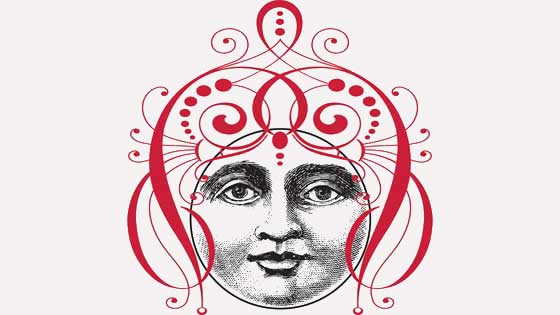
The Magic Oracle is a FREE site but I still must pay dastardly server fees! Please, donate ANY amount... $1, $5, $10, why not $1 million?
THANK YOU for keeping magic alive... and me, a Jolly Genie!

